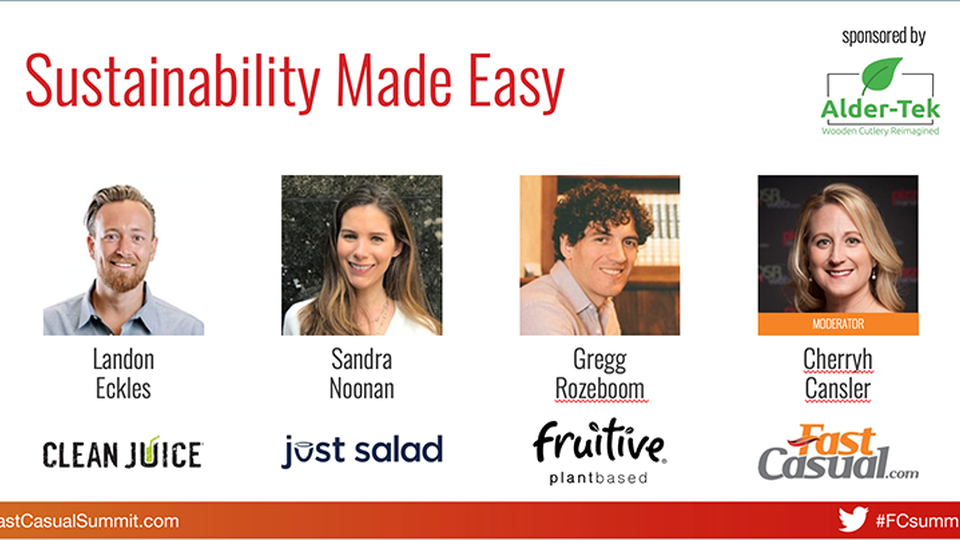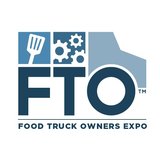Fast Casual Executive Summit
Fast casual brands share tips, advice on sustainability
Today's fast casual brands are focused on going green for many reasons. An increasing number of consumers are not just expecting it, but demanding it. A panel at the Fast Casual Executive Summit shared best practices and guidance for a sustainability strategy.

October 28, 2020 by Judy Mottl — Editor, RetailCustomerExperience.com & DigitalSignageToday.com
Fast casual brands are embracing sustainability for more than a few good reasons: consumers are showing loyalty to brands with a strong sustainability philosophy; reducing the waste stream is a win-win for brands and the global environment; the quest to combat the negative environmental impact of agricultural practices, and the need to reduce the world's carbon footprint.
"Do we want to be the generation responsible for the loss of our jungles and wild places?," asked Gregg Rozeboom, founder and CEO at Fruitive, during a panel talk last week at the Fast Casual Executive Summit. "Do we want to be known as the age of consumption?"
Fruitive is a plant-based, certified organic fast casual with locations in Virginia Beach, Norfolk, and Washington D.C. The brand uses plant-based options from packaging to products, and all menu items are made from scratch.
Rozeboom cited a few statistics to illustrate his questions: in 1950, there were 2.6 billion people on the planet and two-thirds of the earth was rain forest but today the population is 7.89 billion and the world has used up one-third of its rain forests and wild plants in just seven years.
"At this current rate there will be no jungles in seven years, said Rozeboom.
Also, on the sustainability panel talk, sponsored by Alder-Ted Manufacturing, were Landon Eckles, co-founder and CEO for Clean Juice and Just Salad Chief Sustainability Officer Sandra Noonan.
The session was one of nearly a dozen during the annual Networld Media Group conference, now in its 15th year, which draws hundreds of restaurant leaders, executive and experts seeking insight on trends, online learning sessions, and an opportunity to network.
The why in going sustainable
Just Salad revised its mission statement this year with an even stronger focus on a sustainable year, noted Noonan.
The brand launched with a sustainable strategy in 2004, and kicked off by offering reusable bowls to customers. Its goals now include zero waste to a landfill by 2022, diverting 100,000 pounds of single-use plastic from the landfill through its reusable bowl program and developing a 360-degree composting program at all its New York City locations by separating food waste in kitchens, serving areas, and dining rooms.
The company has been recognized by the Environmental Protection Agency as a regional WasteWise Award winner.
"We're about everyday health and sustainability. We're striving to shape behavior for the 21st century, to divert waste from landfills, translate the sustainable quest to dining, zero plastic to landfill," Noonan said. The brand is also focused on reducing the carbon footprint.
"We're looking at a carbon footprint label for menu items, like the calorie label, and just like having to cut emissions we need to stay on a carbon budget," she said.
At Clean Juice, the sustainable target is about how food is raised and farming practices involved. Clean Juice, founded in 2014, is a USDA-certified organic juice bar franchise with over 100 locations and 55 in development in 23 states.
"We're super passionate and take a different approach than most," said Eckles, noting that when many consumers hear the word sustainable they often think about plastics.
"Agriculture is largest contributor of fine particles into atmosphere so the way we farm is a major issue," he said, explaining that's why Clean Juice is USDA organic certified from products to staff learning. "We're focused on the effect farming is having on this world."
Rozenboom shared a statistic to reflect the need for sustainability. When it comes to land, 83% is used for agriculture which he said is not an efficient use of the land given beef represents just 18% of US consumer-consumed calories.
"We can all do our part to use land more effectively and QSRs can do more plant-based menus," he said, noting he was proud to see Burger King and Taco Bell head down the plant-based menu path, as well as Trader Joe's in offering more plant-based products.
"We can do our part one menu item at a time," he said.
Sustainability in the era of COVID
A big issue cited by brands that are considering going sustainable is that organic means more expense. But it's not as expensive as many brands may realize.
"Yes, sustainability adds to the bottom line," said Noonan, but her brand is already seeing big wins. It just launched a climation menu listing the seven lowest emission product items and sales are increasing over 100%, with a 20% sales increase overall.
"It's not only sales increasing but it's increasing our brand image. It's proving to have a lasting bump," she said.
Just Salad is working with a research team to investigate consumer behavior when it comes to sustainable menu items and the impact of providing details such as an item's carbon footprint.
"I understand it's hard [cost wise for some brands] but not impossible and it's certainly been worth it but it's doable and it's wanted by consumer," Noonan said, adding, "it's been the differentiator for us and we wouldn't have grown as fast if we didn't have it. The cost will come down as we scale."
Any additional costs, however, in times like the COVID-19 pandemic, can be extremely hard, as surviving the coronavirus is a huge challenge. But even the pandemic has also brought a silver lining, noted the panel.
"In one way COVID-19 has been a blessing as more people are conscientious of their health," said Eckles, whose brand's sales went negative when shutdowns and social distancing mandates hit hard in March and April.
"But we've seen positive sales growth since, double digits," he said, acknowledging that sourcing products and supplies proved extremely challenging due to global supply chain issues.
"On the flip side more people want it [sustainable menu options] and we have to be nimble to serve the right materials as consumers are more aware and they want to be preventative in health."
Register here to watch the free session here.







